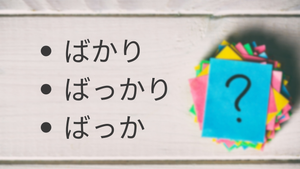The Meaning and Use of 'ばかり (ばっかり)'
'ばかり' attached to a verb in its past form conveys the idea of 'just did something.' It's a useful expression to indicate that an action or event has recently concluded.
- Structure: [Verb in past form] + ばかり
- Example: 食べたばかり (tabeta bakari) – 'just ate'
In casual conversations, 'ばかり' often turns into 'ばっかり,' which retains the original meaning but adds a more informal tone.
The More Casual 'ばっか'
In relaxed conversations, especially among young people or close friends, 'ばっかり' often gets shortened to 'ばっか.' This is a highly casual expression.
- Formal: マイクは勉強ばかりしています。
- Semi-Formalマイクは勉強ばっかりしてるんです。
- Casual: マイク、勉強ばっかりしてる。
- More Casual: マイク、勉強ばっかしてんの。

Check out our podcast episode where I use 'just moved,' showcasing 'ばかり' in natural speech.
Examples
-
After Eating:
- Formal: 私は食べたばかりです。
- Semi-Formal: 私は食べたばっかりなんです。
- Casual: 私、さっき食べたばっかりだよ。
- More Casual: (私/俺)、食べたばっか。
-
After Arriving:
- Formal: ミカは家に着いたばかりです。
- Semi-Formal:ミカは家に着いたばっかりだそうです。
- Casual: ミカ、家に着いたばっかりだって。
- More Casual: ミカ、家に着いたばっからしいよ。
Points to Note
While 'ばっか' is great for conveying familiarity and friendliness, it is not suitable for formal situations or written language. It's important to choose the right expression based on your audience and setting.
Note on the Usage of '〜したばかり'
In this article, we focus exclusively on the use of 'ばかり' in the context of '〜したばかり,' which translates to 'just did something' in English. This particular usage of 'ばかり' is employed to indicate that an action or event has recently concluded. It's important to remember that this form is attached to the past tense of verbs to express the immediacy of the action that has just taken place.
Conclusion
Understanding and differentiating between 'ばかり,' 'ばっかり,' and 'ばっか' can enrich your Japanese conversational skills and fluency. Learning casual expressions is key to grasping the nuances of daily conversations. Keep up the good work, and happy learning! 📚


